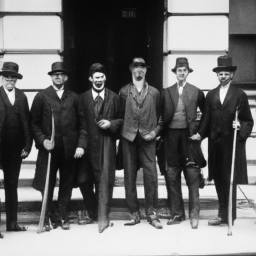During the Gilded Age, rapid urbanization put extreme stress on urban dwellers, many of whom were immigrants. To get what they needed, many of these individuals turned to the political machines that existed in their city. These machines were intricate networks of politicians, businesses, and community leaders that promised support, protection, and resources in exchange for votes and loyalty. Political machines were often associated with corruption, bribery, and coercion, but they also played a significant role in shaping American politics and society.
A political machine is a political organization that seeks to maintain power by controlling elections, government appointments, and patronage. Political machines are often characterized by their use of rewards and punishments to incentivize and control voters, their reliance on personal relationships and connections to build support, and their ability to mobilize large numbers of people to vote and engage in political activity. Political machines have existed in American politics since the 19th century and have played a significant role in shaping the country's political landscape.
One of the most famous political machines in American history was Tammany Hall in New York City. Tammany Hall was a Democratic Party machine that controlled New York City politics for more than a century. Tammany Hall was notorious for its corruption, bribery, and use of violence to maintain power, but it also provided vital services to the city's poor and immigrant communities.
Political machines often rely on patronage and the spoils system to maintain power. Patronage involves the distribution of government jobs and contracts in exchange for political support. The spoils system refers to the practice of rewarding political allies with government positions and contracts. Both patronage and the spoils system were widely used by political machines in the 19th and early 20th centuries.
Political machines also rely on a strong party organization to maintain power. This organization includes political bosses, ward leaders, and precinct captains who work to mobilize voters and deliver them to the polls on Election Day. Political machines often use a variety of tactics to ensure that voters support their candidates, including providing transportation to the polls, offering food and drinks, and even paying voters for their support.
The impact of political machines on American politics and society has been significant. On the one hand, political machines have provided vital services to poor and immigrant communities, helping to alleviate poverty and improve living conditions. They have also played a significant role in shaping the political landscape, helping to elect candidates and shape public policy. On the other hand, political machines have also been associated with corruption, bribery, and the abuse of power. They have been accused of rigging elections, suppressing dissent, and using violence to maintain power.
Today, political machines are much less prevalent than they were in the past, but they still exist in some cities and states. In New York's Nassau County, Republicans run for office when the GOP bosses say they can. Paraguay's ruling Colorado Party - a conservative political machine that has dominated government in Asuncion for some eight decades - could continue that reign. The influence of the machine — and politically connected lawyers — is evident in several examples in this year's Democratic primary races.
In conclusion, political machines have played a significant role in shaping American politics and society. They have provided vital services to poor and immigrant communities, helped to elect candidates and shape public policy, but have also been associated with corruption, bribery, and the abuse of power. While political machines are much less prevalent today, they still exist in some cities and states and continue to impact American politics. It's important to understand the history and impact of political machines to fully appreciate their role in American politics and society.
